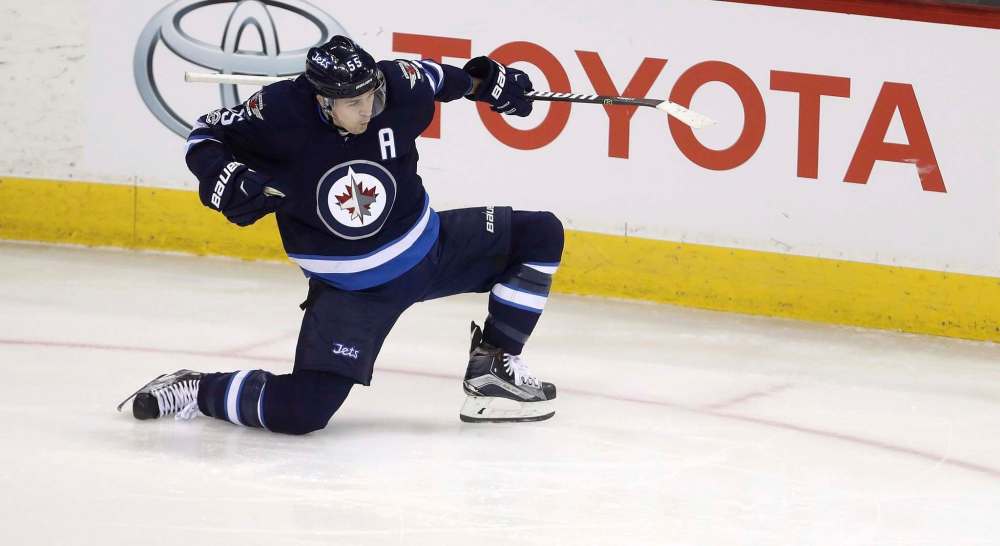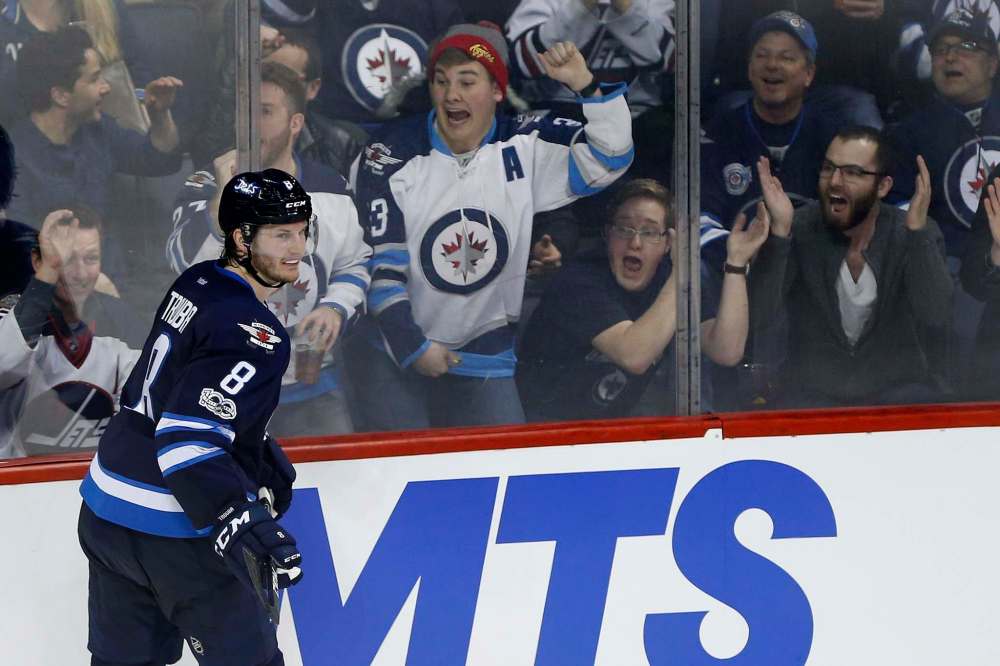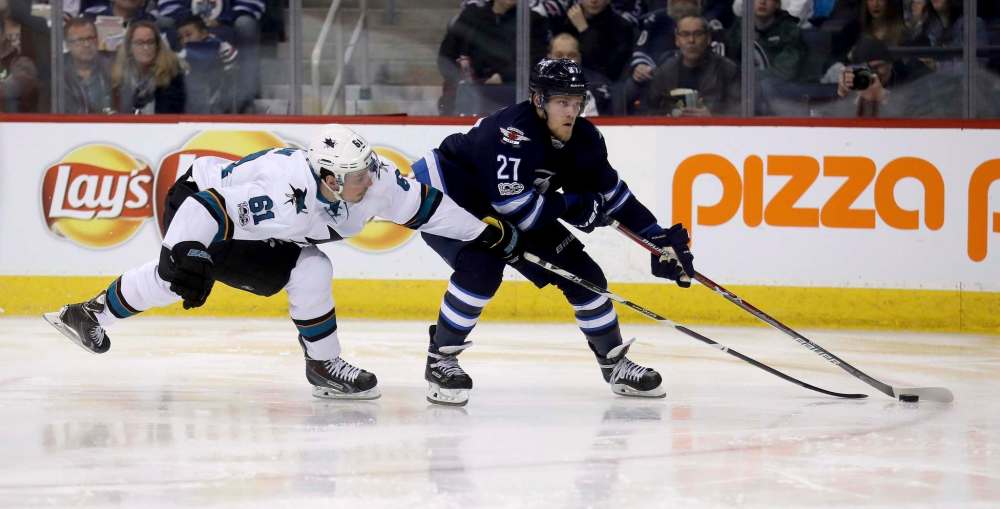Time for Jets to remove the shackles
Team must use salary cap flexibility to get back in playoff hunt
Advertisement
Read this article for free:
or
Already have an account? Log in here »
To continue reading, please subscribe:
Monthly Digital Subscription
$0 for the first 4 weeks*
- Enjoy unlimited reading on winnipegfreepress.com
- Read the E-Edition, our digital replica newspaper
- Access News Break, our award-winning app
- Play interactive puzzles
*No charge for 4 weeks then price increases to the regular rate of $19.00 plus GST every four weeks. Offer available to new and qualified returning subscribers only. Cancel any time.
Monthly Digital Subscription
$4.75/week*
- Enjoy unlimited reading on winnipegfreepress.com
- Read the E-Edition, our digital replica newspaper
- Access News Break, our award-winning app
- Play interactive puzzles
*Billed as $19 plus GST every four weeks. Cancel any time.
To continue reading, please subscribe:
Add Free Press access to your Brandon Sun subscription for only an additional
$1 for the first 4 weeks*
*Your next subscription payment will increase by $1.00 and you will be charged $16.99 plus GST for four weeks. After four weeks, your payment will increase to $23.99 plus GST every four weeks.
Read unlimited articles for free today:
or
Already have an account? Log in here »
Hey there, time traveller!
This article was published 24/03/2017 (3155 days ago), so information in it may no longer be current.
ANAHEIM, Calif. — It wasn’t supposed to be this difficult.
The Winnipeg Jets will miss the playoffs this NHL season — the fifth time in six years since relocating from Atlanta — and there’s plenty of disappointment to go around. Players are unhappy, management and coaches are frustrated and fans are disillusioned.
Amidst the disappointment of another lost season, suggestions about what the team needs to fix have been coming from all angles: trade for or sign a quality, veteran goalie such as Marc-André Fleury, Ben Bishop or Scott Darling; acquire another veteran defenceman; lock up budding superstar D-man Jacob Trouba to a long-term deal; and extend the contract of No. 2 centre Bryan Little.
All of this, however, is expensive and would effect the club’s salary situation for years to come.
As difficult as that outcome may be to accept, a franchise that resides in the smallest, coldest market in the NHL will be trading on some valuable currency next season and they’ll be in position to spend some of it. Years of the slow build may have reached the tipping point… finally.
In a nutshell, the Jets need to continue their above-average drafting record, they must develop players exceedingly well and, just as importantly, the club’s brain trust can’t afford to make major mistakes with contracts.
That is a reality the franchise seemed to ignore in Atlanta, where a win-now policy often resulted in moves that have proven crippling to this day.
Remember the 2007 deadline deal when the Thrashers acquired an aging Keith Tkachuk from St. Louis for a playoff push?
That trade cost the club first- and third-round draft picks in 2007, a second-rounder in 2008 and journeyman forward Glen Metropolit.
In an era where the best teams are built chiefly around players chosen in the first three rounds of the draft, it was incredibly short-sighted. Tkachuk played four playoff games, the Thrashers were eliminated and became playoff pretenders once again.

So far, the Jets’ draft-and-develop strategy has proved fruitful, with one of the most envied collections of young NHLers and prospects in their system.
Patrik Laine, Nikolaj Ehlers, Trouba, Josh Morrissey and Mark Scheifele should be the foundation of a powerful team for years to come, but keeping all of those players content and under contract will be crucial to general manager Kevin Cheveldayoff’s success.
Winnipeg is currently operating with salary commitments of about US$66.6 million in 2016-17, according to capfriendly.com — US$6.39 million under the league’s current salary cap limit.
Whether they are truly a budget team destined to spend below the cap remains to be seen, but the Jets signalled they are willing to spend when they signed defenceman Dustin Byfuglien (five years, US$7.6 million per season) and Scheifele (eight years, US$6.125 million per season) to long-term contracts.
Scheifele’s deal, thought by some to be an overpayment last summer, is looking like a bargain now for the Jets, who have a bona fide 24-year-old star and No. 1 centre.
Big money for the 31-year-old Byfuglien is more controversial — but, really, where else were they going to get a similarly productive defenceman in free agency or the off-season trade market?
Given a choice between handing Byfuglien or unrestricted free-agent forward Andrew Ladd a massive payday, the Jets chose Buff. Considering the long-term deal Ladd signed with New York Islanders (seven years, US$5.5 million per season), the decision makes sense.
Future contracts will test Cheveldayoff’s abilities as a negotiator and ownership’s willingness to spend.
Can Cheveldayoff extend Trouba before his current deal expires after the 2017-18 season and how much will breakout star Ehlers command at the bargaining table when his entry-level deal ends during the same off-season?
Trouba’s dramatic rise since ending his holdout probably means demands in excess of US$6 million per season for a long-term deal. Failing that, the 23-year-old could exercise arbitration rights to force a shorter contract that brings him to unrestricted free agency.

Ehlers, meanwhile, would not have arbitration rights, but could command contract numbers similar to what the Tampa Bay Lightning gave forward Nikita Kucherov (three years, US$4.766 million per season) last fall.
All of this goes to a fundamental premise: well-managed teams want to lock up their best players to reasonable long-term deals, while major moves in the free-agent market are risky business, frequently turning out badly and causing long-term harm.
Winnipeg has dabbled in free agency with some success, signing forwards Mathieu Perreault and Shawn Matthias at reasonable rates. If the Jets are looking for a veteran presence to supplement current No. 1 goaltender Connor Hellebuyck in the off-season, an affordable solution should be available in free agency.
Are pending UFAs such as Bishop or Darling potential targets? Only time will tell, but with Ondrej Pavelec’s deal (US$3.9 million in 2016-17) coming off the books, the Jets should have some flexibility.
Meanwhile, Perreault’s four-year, US$4.125-million-per-season extension kicks in this fall and it bears watching. If he can stay healthy and remain a productive part of the club’s top-six forward rotation, the money will probably be well-spent.
In Minnesota, the Wild are struggling with a prickly off-season issue.
The franchise is without the significant cap room it needs to sign pending restricted free agents Mikael Granlund and Nino Niederreiter, forwards who would probably fetch a combined US$10 million per season on the open market.
At the same time, the team is on the hook for Jason Pominville’s current deal, which has two more years to run at US$5.6 million per year. (Pominville, 34, was a healthy scratch for a recent game in Winnipeg.)
In Los Angeles, the cap-crunched Kings need to find a way to sign pending RFAs Tyler Toffoli and Tanner Pearson, two excellent young players, while trying to shed big salaries owed to aging former stars such as Dustin Brown (six more years at US$5.88 million) and Marian Gaborik (five more years at US$4.88 million).
But the Kings won the Stanley Cup in 2012 and 2014, which can help make the pain more tolerable.
In Chicago, the Blackhawks are the gold standard, having developed and refined the modern template for success leading to Cup wins in 2010, 2013 and 2015.
The basic blueprint involves a handful of players making most of the money (i.e. Patrick Kane, Jonathan Toews, Corey Crawford, Marian Hossa, Artem Anisimov, Duncan Keith, Niklas Hjalmarsson and Brent Seabrook), not making mistakes with the players they give no-movement contracts to and giving the bulk of the other members of their roster low-money, short-term deals and trading those support players when they reach an elite level.
It’s a tall order that most teams, the Jets included, would love to emulate.
But before you reach the promised land, you have to see about making the playoffs first.
mike.sawatzky@freepress.mb.ca Twitter: @sawa14








